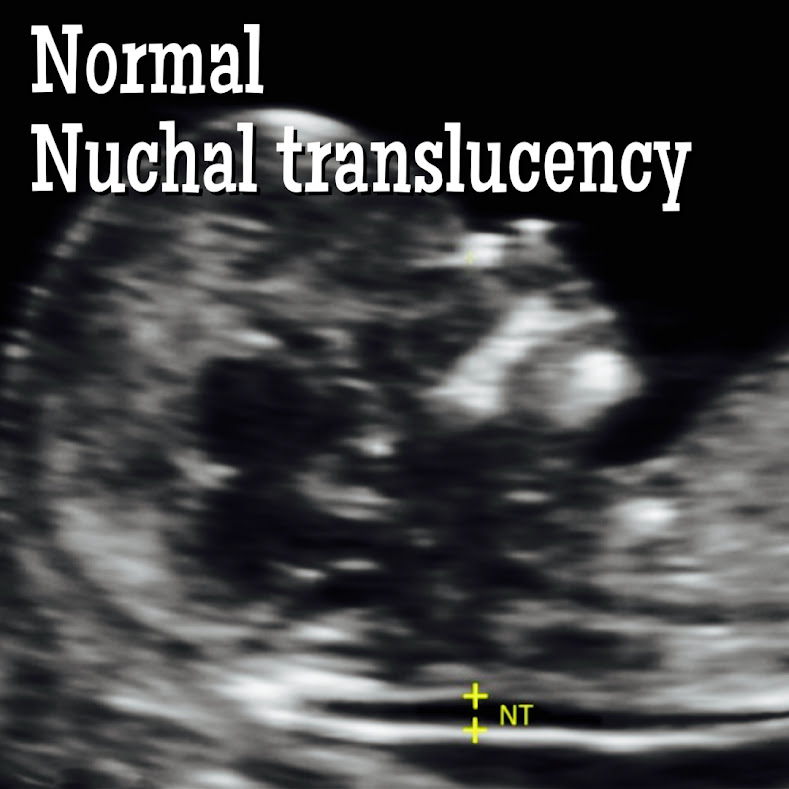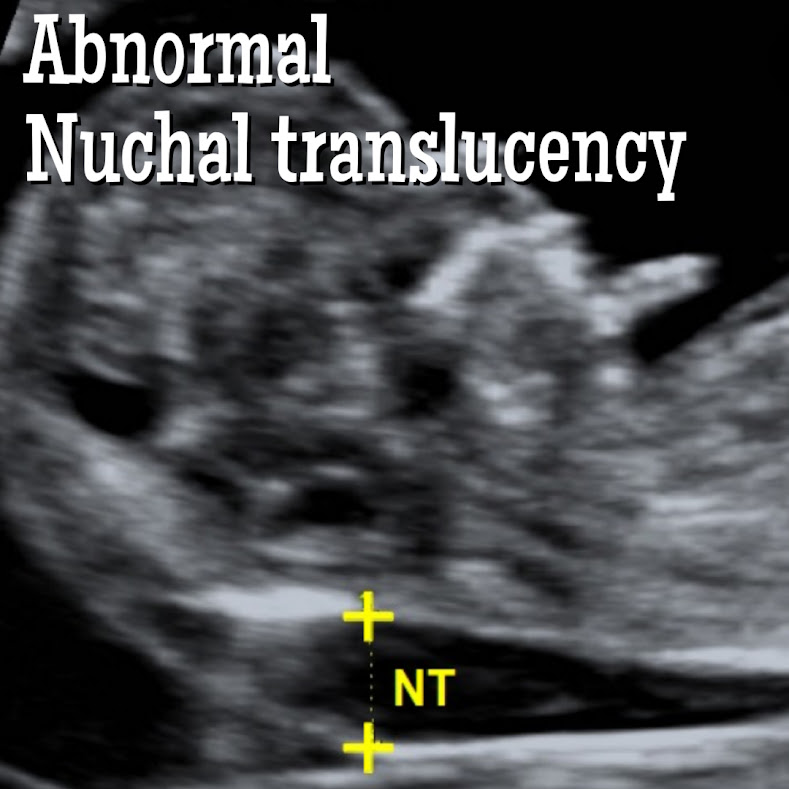The sonographic appearance of a collection of fluid under the skin behind the fetal neck in the first trimester of pregnancy is referred to as nuchal translucency or NT. The thickness of the NT is shown to be increased in fetuses that have chromosomal abnormalities, heart problems, and many other genetic diseases. In this article I am going to answer one of the most frequent question I get asked all the time as an Ultrasound Tech and that question is “What does a Thickened Nuchal Translucency Mean?” Ready? Let’s break it down.
Nuchal Translucency. What does a Thickened Nuchal Translucency Mean?
When is the Nuchal Translucency performed?
As I stated previously, the Nuchal translucency is an ultrasound exam performed by very trained and skilled ultrasound techs and a Radiologist Doctor. This test is mainly to detect an abnormal sonographic appearance of fluid on the back of a fetus neck, this abnormal sonographic appearance is only present when there are chromosomal or genetic abnormalities.
Nuchal Translucency has to be done at a specific time for optimal results. Therefore, at the end of the first trimester of your pregnancy, your healthcare provider may suggest one of numerous prenatal exams, one of them is probably going to be a nuchal translucency test. NT screening is often performed between 11 and 13 weeks of pregnancy. After then, the tissue becomes thicker and opaque, rendering unreliable results.
What does the nuchal translucency test measure?
NT screening, also known as nuchal translucency screening, is a specialized standard ultrasound conducted at the end of the first trimester of pregnancy. It assists physicians in determining whether a baby is statistically more likely to have chromosomal abnormalities. The nuchal fold is a small, clean region located at the back of a developing infant’s neck. This area tends to accumulate fluid in infants with chromosomal disorders, according to studies.
Babies with a higher amount of fluid at the base of their necks are statistically more likely to have chromosomal abnormalities such as Down syndrome (trisomy 21), Edwards syndrome (trisomy 18), or Patau syndrome (trisomy 13). All of these disorders are characterized by the presence of an extra copy of chromosomes on a particular set of chromosomes (chromosome 21, 18, or 13, respectively). They can result in cognitive impairments and mild to severe birth abnormalities. The likelihood of a baby having a condition increases with the age of the mother, however disorders can affect people of any age.
Remember that nuchal translucency is not a 100 percent reliable. Due to the frequency of false positives with the NT screening alone, it is sometimes paired with a blood test to provide more information about the likelihood that your baby may be born with a genetic condition.
What is the standard NT measurement?
- Normal NT measurements vary based on the gestational age of the pregnant woman.
- In general, most physicians consider a screening NT value of less than 3 mm at 12 weeks to be normal.


What is the accuracy of Nuchal Translucency.
The screening done by NT can detect approximately 80 percent of fetuses with trisomy 21 and other severe aneuploides, with a false positive rate of only 5 percent. It is possible to improve detection to a level of 90 percent by using NT in conjunction with maternal serum free -hCG and PAPP-A.
There is currently evidence that the detection rate can be increased to approximately 95 percent, and the false positive rate can be decreased to 3 percent, by adding inspecting the nasal bone, ductus venosus flow, and tricuspid flow. This would result in a lower overall percentage of false positives.
Who should be screened for nuchal translucency?
All pregnant women are advised to undergo a nuchal translucency screening, which is often one of several common prenatal tests administered during the first trimester.
It is ultimately your decision to undergo prenatal testing. The results can help you make decisions about prenatal care. If follow-up testing identifies a chromosomal issue, you can plan ahead for your child’s unique requirements.
Share the post.

How NT screening is performed
A NT is a specialized form of ultrasound that use an equipment that is both sensitive and safe. A sonographer will scan your abdomen with a transducer to measure your baby from crown to rump and verify the accuracy of the fetal age. Then, he or she will detect and measure the thickness of the nuchal fold on the screen.
These measurements, along with your age and the gestational age of your baby, will be placed into an equation that determines the likelihood of a chromosomal problem. This number cannot provide a clear diagnosis, but it can assist you in deciding whether to seek diagnostic tests.
Nuchal translucency and combination screening in the first trimester
The screening for nuchal translucency has a rather high mistake rate when conducted alone. In order to improve the accuracy of results, your doctor will likely recommend a combination screening.
In a combination screening, NT ultrasound results are matched with one or two blood tests measuring and comparing hCG and PAPP-A levels (pregnancy associated plasma protein A). These two hormones are created by the fetus and then transferred into the bloodstream of the mother.
What if the results of your NT are abnormal?
NT value of less than 3 mm at 12 weeks are considered to be normal. Any size more than 3 mm at 12 weeks will be considered abnormal. Therefore, this means that you have a higher probability of having a baby with chromosomal problems. An abnormal nuchal translucency or combination screening test result does not necessarily indicate that your child has a chromosomal problem. They simply indicate that there is a statistical likelihood of a problem. Your physician will therefore recommend more diagnostic tests such as chorionic villus sampling (CVS) or amniocentesis if the findings of your nuchal translucency screening or other prenatal screening tests show that your baby may be at a higher risk of having a genetic issue.
Your doctor may also recommend speaking with a genetic counselor, who can further explain the significance of the results.
Since NT values are also related with fetal heart problems, your doctor may offer a fetal echocardiography at approximately 20 weeks of gestation to examine your baby’s heart. At the 20-week anatomy scan, an abnormally thick nuchal measurement should be taken into account, and extra attention should be devoted to scanning the heart.
Increased NT levels may also be associated with a somewhat increased risk of preterm birth, therefore you may also be examined for this condition.
Try not to overthink the outcomes. Numerous women who have an abnormal screening test result go on to have absolutely normal, healthy children. Also, remember that a normal result on a screening test is not a guarantee that your kid does not have a chromosomal problem, but it does indicate that it is extremely improbable.
Preparation for a nuchal translucency examination
Before an ultrasound, it is typically recommended that the woman have a full bladder. This improves the passage of sound waves within the abdomen, allowing the technician to see the structures more clearly. Ultrasound of the nuchal translucency may be performed.
- Transabdominally (from the outside of the abdomen)
- Transvaginally (transducer inserted into the vagina)
The risk of nuchal translucency
The ultrasound and related blood tests are painless (unless you count the blood test needle prick) and pose no risk to you or the baby.
False positives are relatively prevalent with the NT test alone, which may result in riskier, needless follow-up treatments. However, try to put things in perspective: the prospects of having a totally healthy baby are really favorable.
Related posts:
How to Naturally Shrink Uterus after Pregnancy.
Is Covid Vaccine Safe During Pregnancy?
How to Relieve Stress During Pregnancy.
How to Get Rid of Round Ligament Pain During Pregnancy.
Normal 11 week baby ultrasound. Nuchal translucency.
Final thoughts about Nuchal Translucency. What does a Thickened Nuchal Translucency Mean?
Going through screening exams during pregnancy like the nuchal translucency screening is not an easy task. Everyone who is pregnant has the same goal, to be absolutely certain that their child will be born completely and totally healthy. It is important to keep in mind that early screening tests, such as the screening for nuchal translucency, do not prove anything beyond a reasonable doubt. They simply suggest that additional tests with a higher level of specificity are necessary before any kind of diagnosis can be established.
In the event that you have received the results of a positive test screening and your OB-GYN healthcare provider has not already arranged for one, you should make it a point to inquire about the possibility of obtaining assistance from a genetic counselor who will guide you through the process. Keep in mind that early screening is all about giving you choices, and that having choices gives you the freedom to make the decisions that are best for both you and your baby. I hope this article helps, if you have any further questions, feel free to share your thoughts below.
Zadi, xo
Disclaimer: The medical information on this post is for informational, educational and entertainment use only. Under no circumstances, this information is to replace your doctor’s advice or to treat any disease. For proper care, always visit your doctor. Ultrasoundfeminsider is not liable for any injury caused by reading this article.










Hi, how are you my friend?. I haven’t commented here or visited in a while hahaha
This was a lovely study of this issue; it made alot of highly important things very clear <3
Hi dear, thank you so much for stopping by. As usual is nice to have friends around.
You are welcome my friend; I am happy that you appreciate it. And you are so correct, having good friends around always feels great; I really like to be around you <3
I made that post on the 14th and I can't believe that it's the 28th already — time is flying lol.
[…] Nuchal Translucency (NT) Scan: Performed between 11 and 12 weeks, the NT scan assesses the risk of chromosomal abnormalities such as Down syndrome and certain heart defects. […]